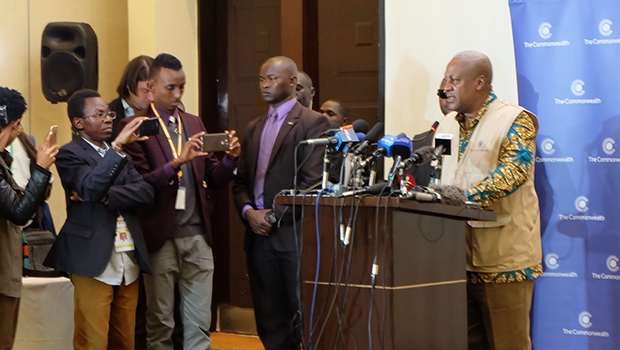 Chair of Commonwealth Observer Group - Kenyan elections “credible, fair and inclusive” [ComSec photo]
Chair of Commonwealth Observer Group - Kenyan elections “credible, fair and inclusive” [ComSec photo]
The supreme court overturned the result of August’s presidential election, nullifying Uhuru Kenyatta’s win and ordering a new vote within 60 days. The ruling, unprecedented in Africa, supported a petition by the veteran opposition candidate, Raila Odinga, 72, who claimed the vote – 54.2% to Kenyatta, 44.9% to him – had been electronically manipulated.
Despite both local and foreign election observers praising the handling of the election and declaring the polls clean (John Mahama, chair of the Commonwealth Observer Group and former president of Ghana, called it ‘credible, transparent and inclusive’), Reuters reported Musalia Mudavadi, a senior National Super Alliance (Nasa) official, as claiming information from ‘confidential sources’ at the election commission showed Odinga had secured victory by just under 300,000 votes, rather than the lead of 1.4m votes officially recorded for Kenyatta. A record 332,000 votes were also listed by Kenya’s Independent Electoral and Boundaries Commission (IEBC) as rejected votes, Quartz Africa reported.
Odinga, son of Kenya’s first vice-president, Jaramogi Oginga Odinga, and also Kenya’s longest-serving detainee, was making his fourth bid for the presidency. After his apparent defeat in 2013, Odinga had also challenged the results of those elections in court, alleging collusion between the president-elect and the IEBC. Fuelling claims of another ‘stolen’ election, Chris Msando, IT manager of the electoral commission, had been found tortured and murdered just days before the vote. Nasa said the killers had sent a ‘chilling message that they will stop at nothing to ensure the outcome they desire’.
In the court’s majority 4-2 ruling, the chief justice, David Maraga – with the deputy chief justice, Philomena Mwilu, and judges Smokin Wanjala and Isaac Lenaola – declared the elections ‘were not conducted in accordance with the constitution and the applicable law. The results are therefore invalid, null and void,’ Kenya’s Daily Nation reported.
Duncan Otieno, a political and legal analyst, said the ruling was ‘huge’ for Kenya and Africa, the Financial Times reported. ‘In Kenya it has restored the integrity and credibility of the judiciary and taken our electoral democracy a notch higher,’ he said. ‘It restores hope in the sections of the people who had lost hope in the electoral process.’
The New York Times called it a ‘historic ruling and a first in Africa … a stunning moment for Kenya’. It was so stunning that the decision seemed to surprise even Odinga. Speaking after the election results were declared on 11 August, James Orengo said Nasa had rejected the counting process as a ‘charade’, and said: ‘Every time an election has been stolen … Kenyans have stood up.’ He added that the opposition would not seek legal redress, declaring: ‘Court is not an alternative … We have been there before.’ Orengo had in mind the failed legal attempt to force a rerun after the election in 2013. This time, instead of seeking to prove enough votes were fake to undermine the vote, Reuters reported, ‘Odinga’s supporters sought to demonstrate that the online tallying process lacked integrity.’
Kenyatta, son of the country’s founding father, disputed the judgment but said he would respect the court’s decision and called for calm, the FT reported. ‘I disagree with it because millions of Kenyans queued and made their choice and six people decided that they will go against the will of the people,’ he said. Days later, though, Kenyatta attacked the judges in a televised address, asking: Who even elected you?’ He added ominously: ‘We have a problem and we must fix it.’
United Press International said Kenyatta was likely to focus his second campaign ‘on the notion that four judges robbed millions of his supporters, who represent a majority of the country if the previous results are to be believed, of their democratic rights. An Odinga upset could embolden Kenyatta loyalists to turn violent.’ Meanwhile, Nasa said it would boycott the fresh elections, scheduled for 17 October, if the electoral commission’s chief executive, Ezra Chiloba, was not removed, the Daily Nation reported.
There had been widespread fears of violent protests by opposition supporters after Nasa officials refused to sign off on the final voting results. More than 180,000 soldiers and police had been mobilised before the election as the east African country braced for a possible clashes following the polls. There had been relatively few deaths following Kenyatta’s election win in 2013 – when he had been facing charges at the International Criminal Court over alleged crimes against humanity committed in the aftermath of the previous election. However, an estimated 1,174 people died after the 2007 polls when protests over the disputed re-election of Kenyatta’s predecessor as president, Mwai Kibaki, erupted into inter-communal violence.



